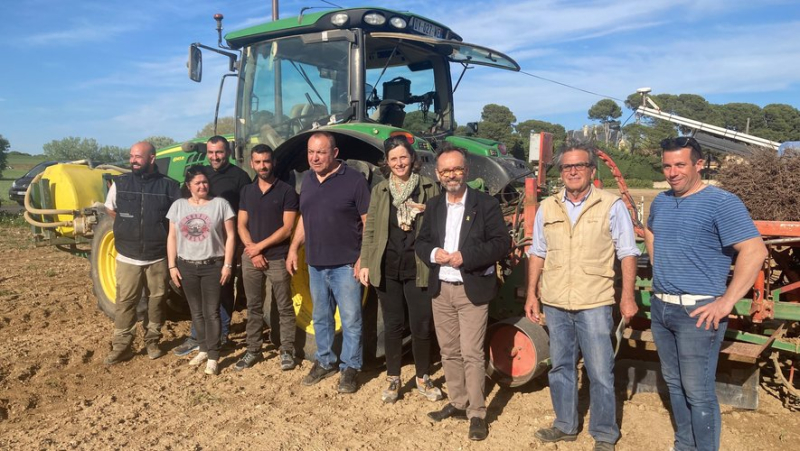Resistant grape varieties: the large-scale experiment launched in Béziers

Robert Ménard and MP Emmanuelle Ménard, surrounded by the actors of this large-scale plantation. Midi Libre – Laurent François
Three varieties of disease-resistant grape varieties from the nurseryman VCR were planted in Pech de Fonserane on approximately 30 hectares, made available by the City. It was the winegrowers of the Vignerons de l’Occitane-Clamery cooperative cellar who carried out the planting and will cultivate these vines.
Guided by a GPS, the tractor advances alone between the future rows. At the back, a worker regularly places the vine plants in a sort of paddle wheel, driven by the machine's motor. Under the guidance of another GPS, every meter, the machine releases the plant which is then planted… It lasts like this for dozens of meters. It is almost 6 p.m., this Thursday, April 11, at Puech de Fonseranes, in front of the Control estate, in Béziers, on the edge of the Departmental road leading to Béziers west. The winegrowers of Vignerons de l’Occitane-Clamery, in Servian, plant resistant grape varieties over an area of 30 hectares.
Accompanied by MP Emmanuelle Ménard, Robert Ménard, the mayor of Béziers, follows the scene with great enthusiasm: "When I think that here, there was a project to build 600 housing units… When I arrived at town hall, in 2014, during the new PLU, it was decided to return 500 hectares to agriculture. Including 90 hectares in this sector, 30 of which have been entrusted to the cooperative winegrowers' cellar of L'Occitane. Another part, covering around 10 hectares, will also soon welcome the Gruss family. "
A real experience
It’is in fact a real viticultural experiment, carried out on a large scale, which is being set up : "These lands were made available to us for a 9-year lease, rejoices Martial Bories, the president of l’Occitane. The tests showed that these plans are sustainable but this time, we are no longer on microvinification."
Beyond the town hall which made the land available to wine growers, the project was carried out by the wine nursery VCR France, a subsidiary of the Italian group based in Gard:< em> "These plantations are the fruit of three years of work, specifies Loïc Breton, the general director of VCR France. We worked with the marketers, the traders Castel and Grands Chais de France, with whom the grape varieties were chosen following various tastings. The goal is to produce a wine that is tastefully acceptable to the consumer."
Natural crossings
These three resistant varieties all come from natural, non-GMO crosses. Each requested a work program of around fifteen years for an investment of 500,000 euros. to 1 M€. The goal is to take the emblematic variety and make it resistant, in particular to certain diseases such as downy mildew and powdery mildew. these lands, Merlot Khorus which was planted on 4 hectares, or 16,000 plants; Soreli (12,000 plants, on 3 ha); and Sauvignon Rytos (6,000 plants on 1.5 ha.) The L’Occitane winegrowers also planted Aramon on a plot (1.3 ha) , in order to study its resistance to drought. Planting these grape varieties leads to "clean" viticulture. They require, in fact, fewer treatments: "We remove 80 % of treatments against downy mildew and powdery mildew", rejoices Loïc Breton.
The first harvest is planned in three years.
I subscribe to read more



